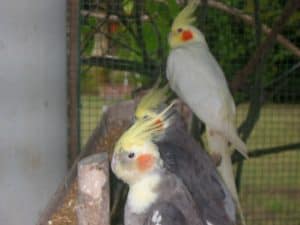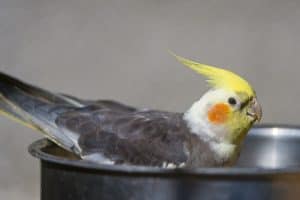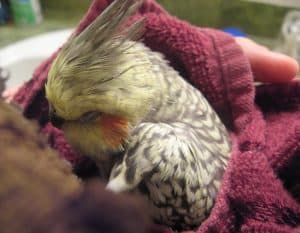Caring for an elderly cockatiel requires a bit more attention and understanding than looking after a younger bird. As your feathered friend ages, its needs change, and it’s up to you to ensure it enjoys a comfortable and healthy life. Knowing how to care for an elderly cockatiel can make all the difference in its well-being.
From diet adjustments to environmental modifications, there are several key areas to focus on. By being proactive and attentive, you can help your aging cockatiel thrive, providing it with the best possible quality of life. Dive into these tips and tricks to ensure your senior bird remains happy and healthy.
Understanding Aging in Cockatiels

Aging in cockatiels, as in humans, brings various changes that require specific care. Older birds often become less active, and you might notice changes in their flight feathers and energy levels. A senior bird might also develop health problems like arthritis or liver disease. Recognizing these signs early ensures timely veterinary care, improving the cockatiel’s quality of life.
Physical changes in elderly cockatiels include feather thinning, slower movement, and weight fluctuations. These changes necessitate dietary adjustments to prevent a calcium deficiency. Consult an avian vet to tailor a suitable diet plan for your aging cockatiel, such as integrating specific food like sunflower seeds sparingly, which provide necessary fats. Proper diet management helps mitigate common health issues old birds face, especially if they start to lose weight.
Behavioral changes in aging cockatiels may include increased sleep or decreased social interaction. Modifying their environment helps address these shifts. Introduce heated perches or a heat lamp to alleviate joint discomfort from arthritis. Place food dish and food bowl at accessible heights to encourage eating and drinking without strain. Creating a comfortable living space helps your feathered friend enjoy its golden years with optimal comfort and ease.
Signs of Aging in Cockatiels
Elderly cockatiels show various signs of aging that you can notice. One common indicator is a decrease in activity levels. Older birds often spend more time sitting quietly and may lose interest in flying high or playing with toys. You might also observe changes in flight feathers, which can become frayed or fall out more frequently.
Physical changes are another sign of aging in cockatiels. Feather thinning or loss, especially around the head and neck, is typical. Weight fluctuations, both loss and gain, can indicate underlying health problems such as liver disease or arthritis. Monitoring your bird’s weight regularly using a bird scale is crucial to catch any significant shifts early.
Behavioral changes can also signal aging. You might find that your senior bird sleeps more or interacts less with you and other household members. Increased sleep is natural, but decreased social interaction can suggest discomfort or health issues. If you notice such changes, consulting an avian vet can help in adjusting the care routine, including modifications to the cage setup with heated perches, cage bars that are easier to grip, and easily accessible food dishes.
Essential Care Tips for Elderly Cockatiels

Specialized Diet & Nutrition
Elderly cockatiels need tailored nutrition to maintain health. Introduce a diet rich in vegetables like carrots and leafy greens, and avoid fatty foods like sunflower seeds. Add supplements to prevent deficiencies, but consult an avian vet for the right mix. Ensure fresh water is available at all times.
Comfortable Housing & Environment
Create a cozy space for your aging cockatiel. Use heated perches or a heat lamp to provide warmth and replace old perches to prevent foot issues. A smaller cage with accessible food bowls and low perches helps reduce strain. Maintaining a consistent temperature and ensuring that cage bars are safe and appropriately spaced is essential to avoid health problems.
Regular Health Check-Ups
Schedule regular visits to an avian veterinarian. Monitor weight to catch any changes early; significant weight loss could indicate health issues like liver disease. Observe your cockatiel for signs of discomfort or alterations in behavior, and seek veterinary care promptly if you notice any.
Bonding & Mental Stimulation
Mental stimulation is crucial for senior birds. Spend quality time interacting, whether it’s hand feeding or watching TV with your feathered friend. Introduce safe toys to keep their mind sharp and avoid boredom. Regular interaction helps maintain their emotional well-being as they age.
- FOR MEDIUM & LARGE BIRDS: This nutrient-rich universal blend food is ideal for cockatiels, parrots, lovebirds and other hookbills.
- IRRESISTIBLE BLEND: Contains premium seeds and vegetables medium and large birds love, such as sunflower seeds and safflower seeds.
- IMPORTANT NUTRIENTS: Fortified nutrition.
- Wild Harvest Universal Blend for Medium & Large Birds is enriched with vitamins and minerals medium and large birds need to support healthy skin and shiny feathers.
- DAILY FEED: Fill birds seed cup daily with fresh seed.
Common Health Issues in Elderly Cockatiels
Older birds like cockatiels face various health challenges as they age. Being aware of these issues helps in providing appropriate health care and ensuring a better quality of life.
Identifying Symptoms
Recognizing symptoms early ensures timely intervention. Look for signs such as weight loss, feather thinning, and changes in appetite. Arthritis often affects older cockatiels, making them less active and causing discomfort when perching. Respiratory issues may present as frequent sneezing or difficulty breathing, while liver disease can cause noticeable changes in the bird’s droppings.
Preventative Measures
Providing preventative care involves several strategies. Regular check-ups with an avian veterinarian are crucial to catch health problems early. Ensure a balanced diet rich in essential nutrients to prevent deficiencies; avoid fatty foods like sunflower seeds. Maintain a clean and safe environment with easily accessible food dishes and heated perches to support mobility and comfort.
Engage your elderly cockatiel with mental stimulation and exercise. Introduce safe toys and activities to keep their mind sharp. Monitor their behavior closely and make adjustments to their care routine as needed.
Grooming and Maintenance

Regular Grooming
Elderly cockatiels need regular grooming to maintain healthy feathers and skin. Gently mist your aging bird with lukewarm water to prevent feather dryness. Use a spray bottle set to fine mist, ensuring you avoid soaking. Regularly trim overgrown nails using an appropriate avian nail trimmer. Avoid cutting into the quick to prevent bleeding. Consult your avian vet for tips on safe grooming practices and addressing health concerns like feather thinning or frayed flight feathers.
Cage Maintenance
A clean cage minimizes health problems for senior birds. Line the bottom with paper to monitor droppings, a key indicator of your bird’s health. Replace soiled paper daily. Clean food and water dishes with hot, soapy water to prevent bacterial buildup. Ensure perches are stable and smooth to prevent foot sores. Soft perches or heated perches can add comfort, especially for birds prone to arthritis or those needing additional warmth.
Health Monitoring
Frequent health checks catch early signs of issues. Watch for changes in weight, droppings, and behavior. Use a digital scale to weigh your elderly cockatiel weekly. Any significant weight loss or abnormal changes should prompt an avian vet visit. Check for signs of discomfort or pain, such as excessive sleeping or reduced activity. Regularly observe their feathers and skin for abnormalities. A proactive approach helps maintain your feathered friend’s quality of life during their golden years.
Caring for an elderly cockatiel requires understanding and adapting to their changing needs. By focusing on diet, environment, and regular health check-ups, you can ensure your feathered friend thrives in their golden years. Pay attention to any signs of aging and consult an avian vet for tailored advice. Regular grooming, mental stimulation, and a clean habitat are key to maintaining their health and happiness. With attentive care, your senior cockatiel can enjoy a comfortable and fulfilling life.
Key Takeaways: Caring for an Elderly Cockatiel
- Recognize aging signs: slower movement, frayed flight feathers, feather thinning, weight fluctuations, longer naps, and reduced social interaction.
- Vet-first approach: schedule check-ups every 6 months, weigh weekly on a digital scale, and act quickly on weight loss or behavior changes.
- Senior diet tweaks: emphasize leafy greens, carrots, and vet-approved, low-fat pellets; limit sunflower seeds to prevent obesity and liver strain.
- Comfortable habitat: add heated perches or a low-wattage heat lamp, lower and widen perches/food bowls for arthritic joints, and maintain 65–80 °F (18–27 °C).
- Enrichment & bonding: daily gentle interaction, safe chew/foraging toys, and calm out-of-cage time to combat boredom and depression.
- Grooming & hygiene: mist feathers lightly, trim overgrown nails carefully, change cage paper daily, and disinfect dishes to reduce infection risk.




